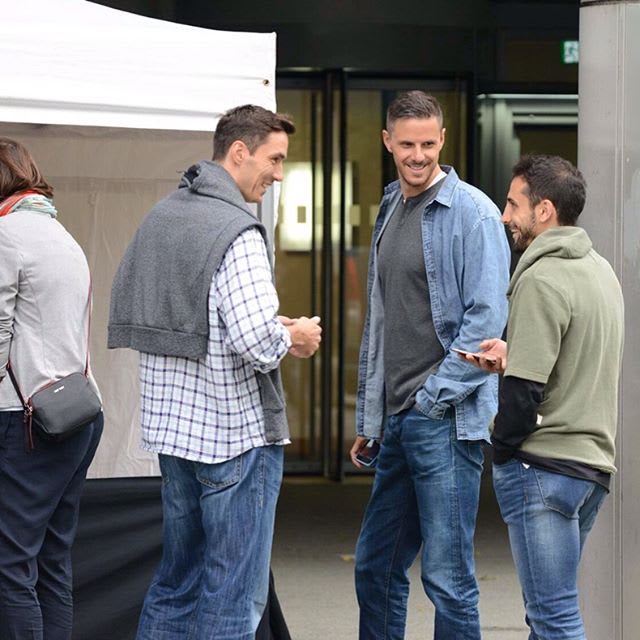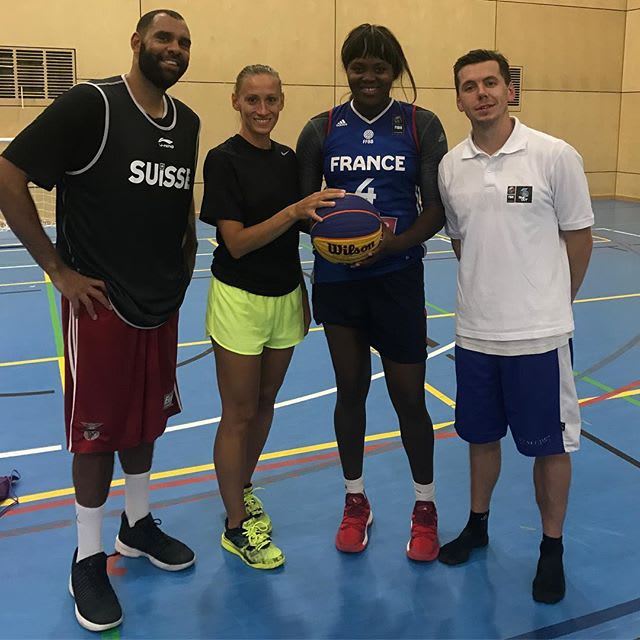Players earn BA Honours degrees in Leadership & Management through TIME-OUT initiative
MIES (Switzerland) - Several elite basketball players that have enjoyed many years as professionals are well on their way to establishing new careers with the help of the FIBA Europe TIME-OUT program.
MIES (Switzerland) - Several elite basketball players that have enjoyed many years as professionals are on their way to establishing new careers with the help of the FIBA Europe TIME-OUT program.
Katalin Honti (Hungary), Jiri Welsch (Czech Republic), Bostjan Nachbar (Slovenia), Rok Stipcevic (Croatia), Nicolas Dos Santos (Switzerland) and Robert Fultz (Italy) have earned BA Honours degrees in Leadership & Management from the Business School of Northumbria University in the United Kingdom.
 Welsch, Nachbar and Stipcevic at Northumbria University
Welsch, Nachbar and Stipcevic at Northumbria University
By completing the three-year course, all six have invested in their future.
"This program was a very important step for me in my transition of careers," said Honti, a long-time Hungary international who competed for many years in the EuroLeague Women.
"I now have behind me a very difficult three years in which I gained a lot of useful knowledge that I can use in the future. I put a lot of energy and time into it, but it was worth it."
 Dos Santos (left) and Honti (second from left) earned BA Honours degrees in Leadership & Management
Dos Santos (left) and Honti (second from left) earned BA Honours degrees in Leadership & Management
All six players learned about the connection between business and sport.
Welsch, who spent several years in the NBA before returning to compete in Europe, said: "TIME-OUT presented me with a unique opportunity to transfer myself from playing into the life after basketball. It came at the perfect time as I was pondering the end of my career.
"Inside the TIME-OUT, I met a lot of familiar faces, I made some new friends as well, I got to know key figures inside the FIBA organization but it especially gave me the chance to learn about the behind-the-scene aspects of our sport. It was a great way to start my second career which I hope to be as successful as the first one."
Each of the students has begun to rely on a strong players support system
"I met a lot of people and built a network of contacts in the world of basketball," Honti said.
"Also thanks to the program, it has become clear to me what direction I should take in my future career. I have always been interested in how FIBA works and to get to know in detail the organization whose competitions I have participated in for many years as a player. I’ve found that organizing basketball tournaments and events is as impressive as the game itself.
"Overall, the program helped me start my future plans with the right confidence, knowledge, and connections. I hope that by gaining more knowledge and with perseverance, I will be able to be a part of the FIBA family in some way in the future."
Fultz, a point guard in the Italian league since 1999, is honored and proud to have completed the three-year course. It was challenging, especially to combine the studies with his career. Even so, he has already started taking advantage of what he learned.
"Thanks to the notions learned in these years of study, I managed to open a company and develop an application, called TeamBook, for basketball teams that will soon enter the market. I thank FIBA for the opportunity they gave me with the TIME-OUT project and I hope that many other athletes are lucky enough to undertake this beautiful journey."
“IT ESPECIALLY GAVE ME THE CHANCE TO LEARN ABOUT THE BEHIND-THE-SCENE ASPECTS OF OUR SPORT. IT WAS A GREAT WAY TO START MY SECOND CAREER WHICH I HOPE TO BE AS SUCCESSFUL AS THE FIRST ONE."”
There is already an outstanding legacy of the TIME-OUT program. Graduates have gone on to assume roles with national federations. Elvira Dushku of Kosovo and Kaspars Cipruss of Latvia have become secretary generals while five have become board members and another five have taken up key positions on federation staffs.
Meagan Hoffman is on the Strategic Planning Committee for Basketball Ireland and Karen Twehues is a Member of the Executive Board in Swiss Basketball. Steff Collins is on the board of Basketball Wales and Julie Page is on the board of Basketball England. Tiina Sten and Ville Kaunisto are both on the board of Basketball Finland. Kaunisto was also elected last year to Finland's National Parliament.
Welsch, Nikita Morgunov (Russia), Natasa Kovacevic (Serbia), Michaela Uhrova (CBF 3x3), Yasemin Horasan (Head of Youth Women national teams Turkey) have important roles at their federations.
Guy Muya is a general manager of the Antwerp Giants and Raffaela Masciadri is the team manager of a EuroLeague Women outfit, Schio. Masciadri is also the President of the Athlete's Commission for CONI (Italian Olympic Committee) and another graduate, Maja Erkic, is a member of the Slovenian National Olympic Committee. Two other graduates work for FIBA. They are Jovana Vukoje, who works with FIBA 3x3, and Gintaras Leonavicius, who is with FIBA Europe Competitions Department.
TIME-OUT, an initiative created by players for players, was launched by FIBA Europe and its national federations in 2017.
"It's wonderful to see them getting top-tier university degrees," FIBA Executive Director Europe Kamil Novak said. "TIME-OUT has provided a great framework for players to jump into new careers. They have applied themselves in the classroom and worked hard, just as they did on the court."
The next workshop of the TIME-OUT 2.0 was due to take place in Prague at the end of August but will now be online.
The move to assist elite basketball players across Europe, at the end of their careers, in making the transition from sport into work came on the back of recommendations by the European Commission on dual careers and the reintegration of professional sportspersons into the labor market.
It receives financial support from the EU's Erasmus+ Sport program.
FIBA